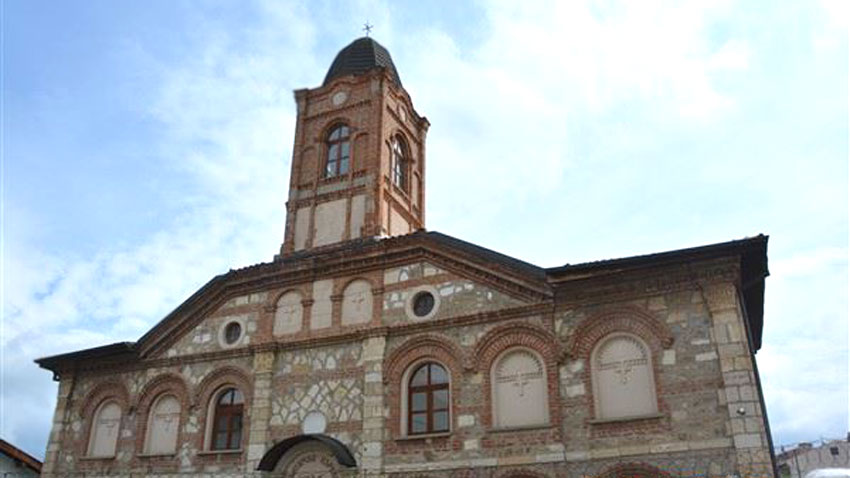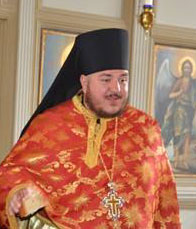The church of St. George the Great Martyr in Edirne was built in 1880 by permission of Sultan Hamid II in an architectural style typical of the late Bulgarian National Revival – an airy, high-ceilinged triple-nave basilica. Up until 1940 the priests here were Bulgarian citizens, after which they were replaced by Bulgarian priests from Istanbul, where another symbol of Bulgarian Orthodoxy rises - the iron church St. Stephen.

In 1951 the St. George church in Edirne closed doors to believers, fell into disuse and the building gradually fell into a state of dilapidation. It was then up to the patriotically-minded Bulgarians in Edirne like Philip Cikirik, who made every effort to keep the church building in good repair and who started its restoration, a plan for which was drafted in 2001. After being officially given the go-ahead by the Turkish authorities, the St. George church in Edirne was renovated and opened with an official ceremony on 9 May, 2004. Alongside the grand Episcopal Church St. Constantine and Helena, the St. George church is now a hub for Bulgarians in Edirne and is on the pilgrimage trail for many tourists. On the second floor of the renovated church a small ethnographic exhibition has been put together, presenting the life of the Bulgarian community in this part of Turkey:
 “There are many guests coming to Edirne now, both Bulgarian and Turkish. And when they see the church building in the marketplace they invariably go inside to take a look around,” says Alexander Cikirik, priest at the St. George church in Edirne. His son – Georgi Cikirik studies at the seminary in Plovdiv and father Alexander is hoping to see him one day continue the work of his forefathers. Here is more from Father Alexander about plans on the church’s patron saints’ day Gergyovden, St. George’s Day, May 6:
“There are many guests coming to Edirne now, both Bulgarian and Turkish. And when they see the church building in the marketplace they invariably go inside to take a look around,” says Alexander Cikirik, priest at the St. George church in Edirne. His son – Georgi Cikirik studies at the seminary in Plovdiv and father Alexander is hoping to see him one day continue the work of his forefathers. Here is more from Father Alexander about plans on the church’s patron saints’ day Gergyovden, St. George’s Day, May 6:
“As always on 6 May, this year we shall have many guests coming here from Bulgaria, Greece and Turkey. Thanks to the good contacts between the two neighbouring countries Bulgaria and Turkey, the tourist flow has increased. As in so many places across Bulgaria, on 6 May we play Bulgarian folk music and in the square in front of the church we celebrate Georgyovden together with our Turkish friends living here and the guests who have come from near and far. We always celebrate together – Christian as well as Muslim holidays – and together we pray for peace, love and understanding. We respect each other’s religion, because when we pray what are we asking of God? We all pray for health, happiness, respect, peace and love. That is what any religion wants. What matters most is, I think to work together, anyone can pray in any language they want. Prayers always sound the same.”
English version: Milena Daynova
Photos: courtesy of Alexander CikirikThere is no exact statistic on the number of Bulgarians living abroad, but a report from the Ministry of Foreign Affairs from last year indicates that around 2.8 million Bulgarians are living outside the country . According to the 2021 population census..
The nature protection organization WWF - Bulgaria is launching a campaign entitled "Subscribe to Nature". The disappearance of wild animals is a series in which we play the main role. In less than one human lifetime, 73% of vertebrates in..
The Embassy of France and the French Cultural Institute brought together scientists to present their experience and the scientific challenges in Antarctica, as well as the fight against climate change. Partners of the event were the..
Over 3.5 million Ukrainians have arrived in or passed through Bulgaria since the beginning of the war. Nearly 200,000 people have found temporary..
At the Bulgarian Embassy in London, Prof. Bettany Hughes presented excerpts from the new BBC series - Wonders of Bulgaria. Prof. Bettany..
An innovation for the treatment of diabetic foot ulcer using the patient's own tissue and artificial intelligence has been implemented at the University..

+359 2 9336 661
